2024年中考英语专题课件(冀教版)第24讲 任务型阅读课件(共50张PPT)
文档属性
| 名称 | 2024年中考英语专题课件(冀教版)第24讲 任务型阅读课件(共50张PPT) |
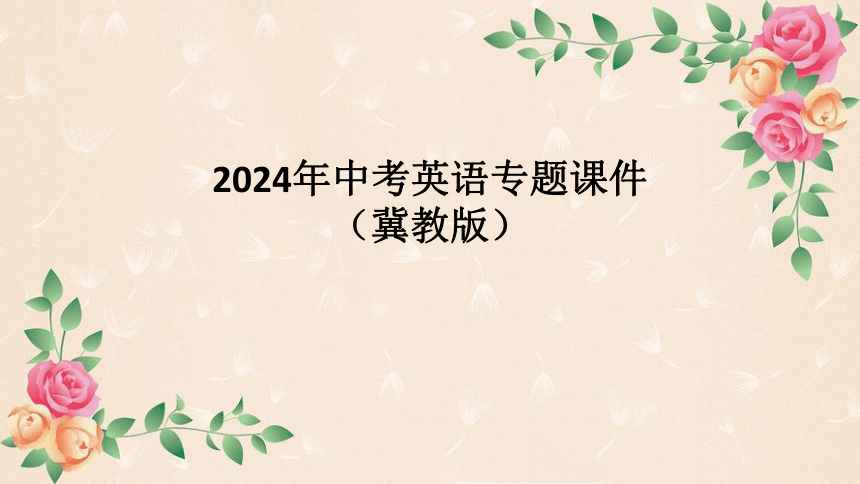
|
|
| 格式 | pptx | ||
| 文件大小 | 2.2MB | ||
| 资源类型 | 教案 | ||
| 版本资源 | 冀教版 | ||
| 科目 | 英语 | ||
| 更新时间 | 2024-05-09 11:02:50 | ||
图片预览

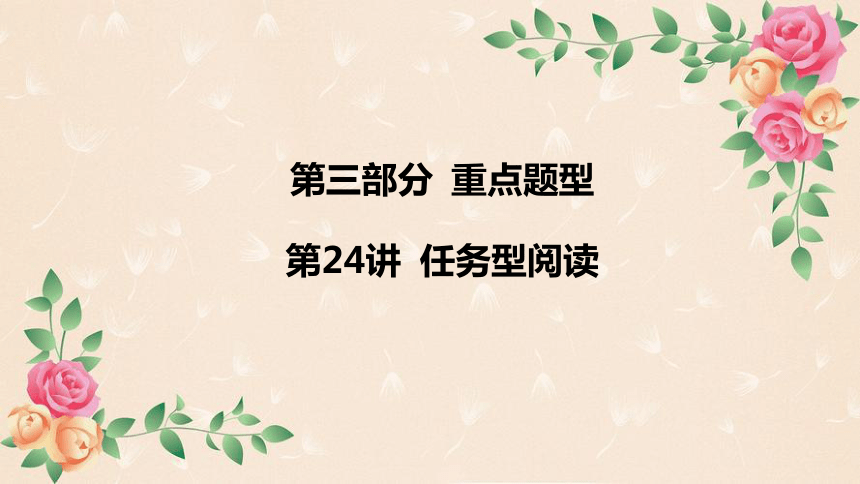
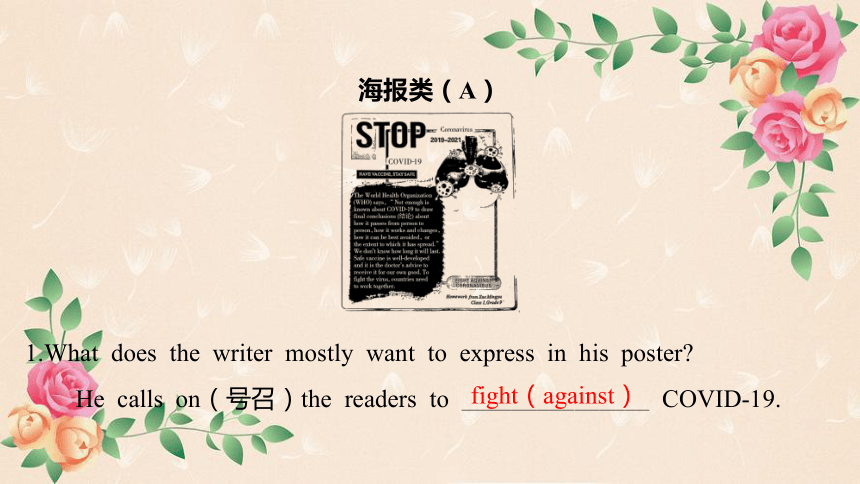
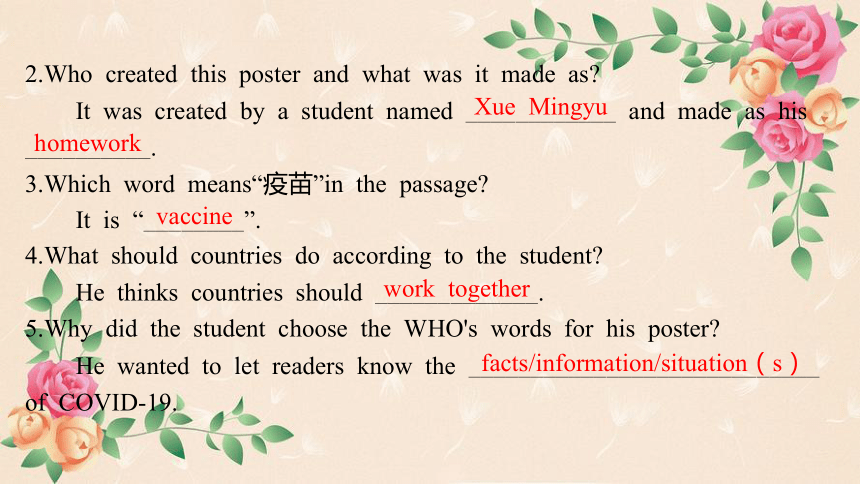
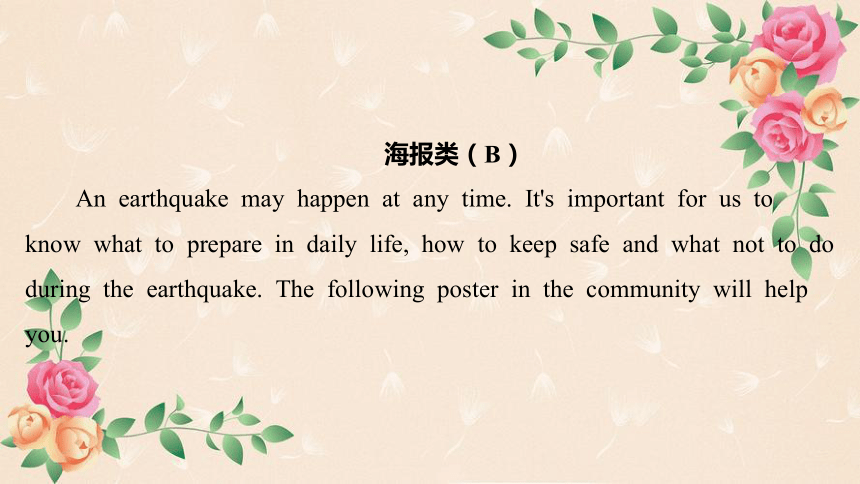
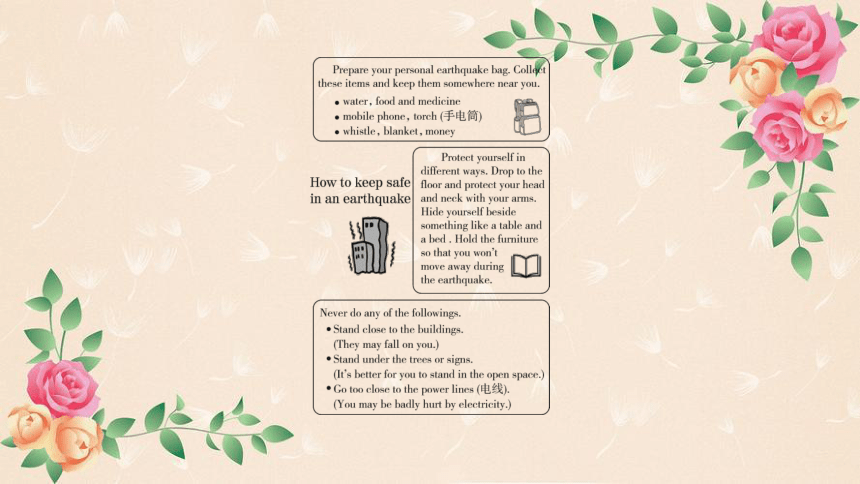
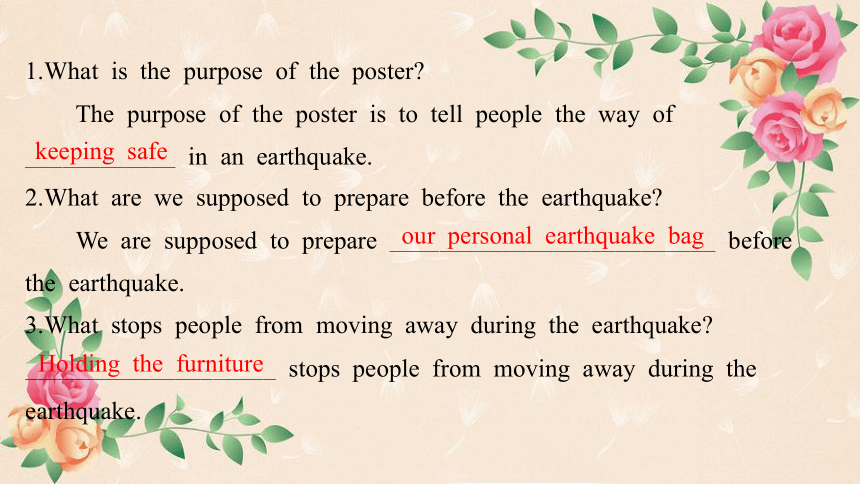
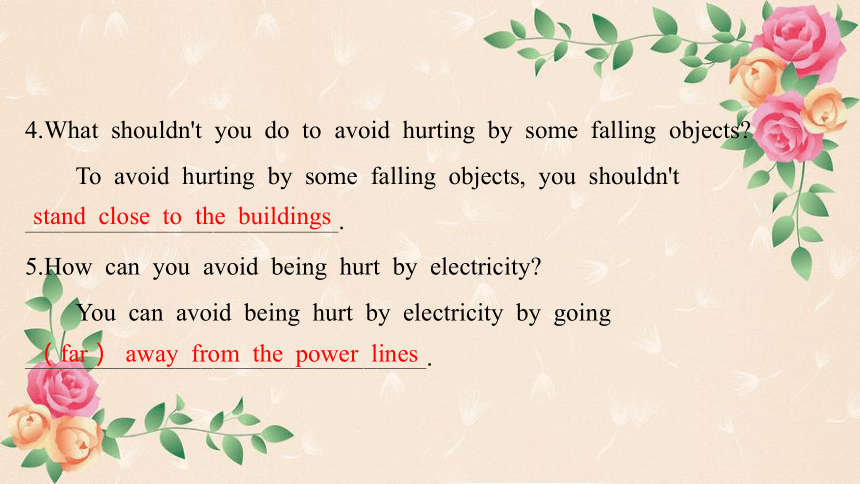
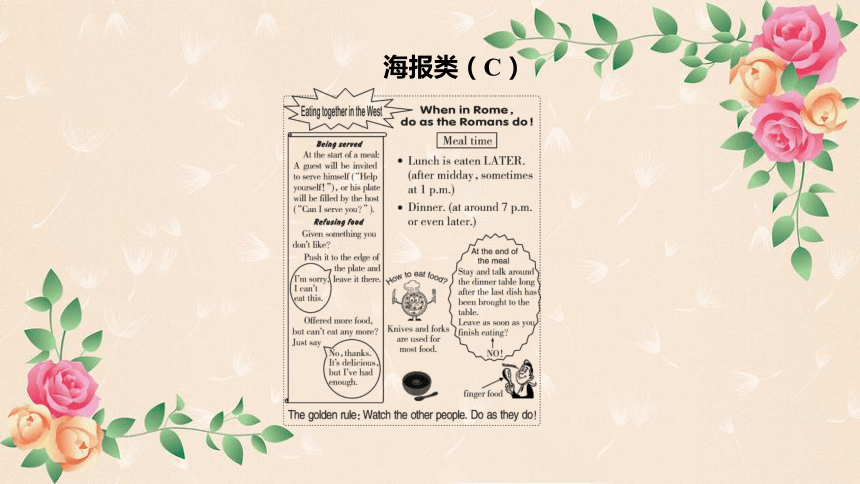
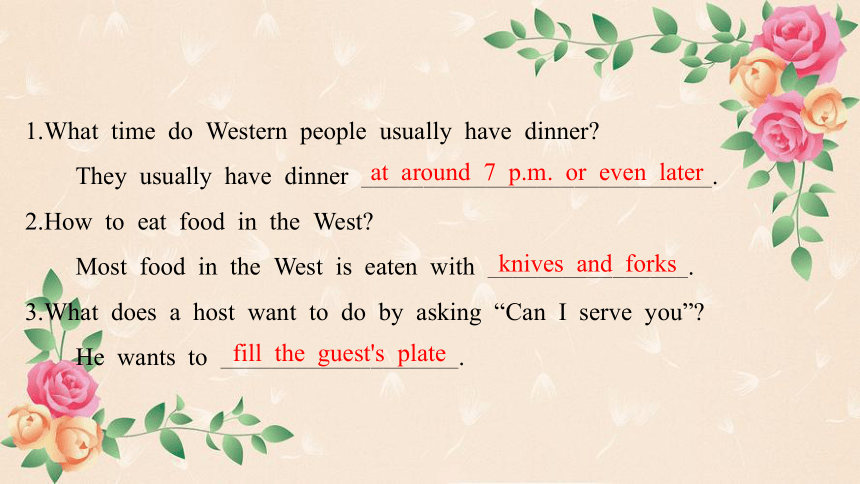
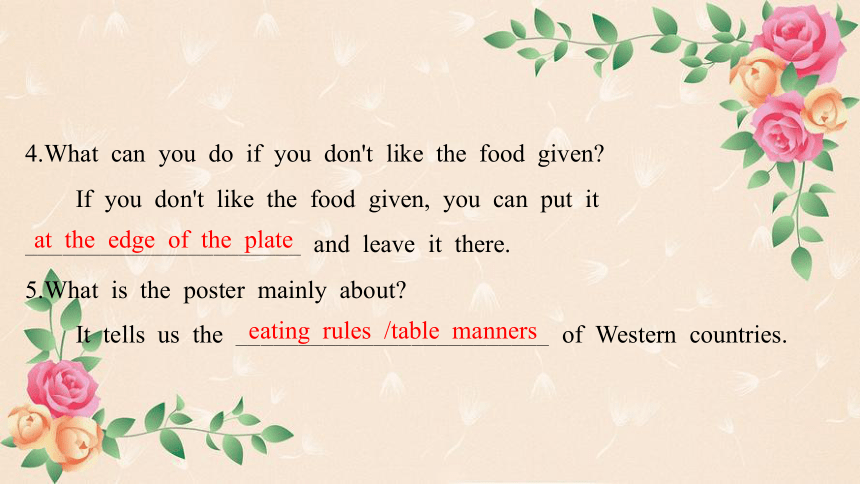
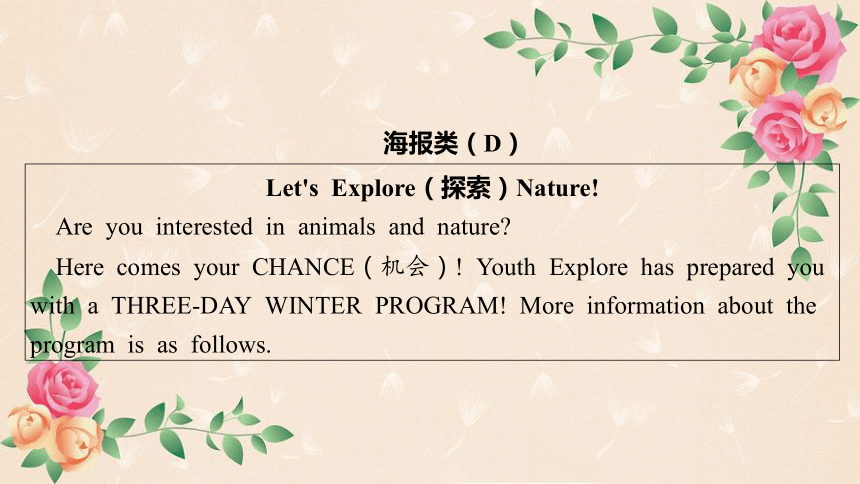
文档简介
(共50张PPT)
2024年中考英语专题课件
(冀教版)
第三部分 重点题型
第24讲 任务型阅读
海报类(A)
1.What does the writer mostly want to express in his poster
He calls on(号召)the readers to _______________ COVID-19.
fight(against)
2.Who created this poster and what was it made as
It was created by a student named ____________ and made as his
__________.
Xue Mingyu
homework
3.Which word means“疫苗”in the passage
It is “________”.
vaccine
4.What should countries do according to the student
He thinks countries should _____________.
work together
5.Why did the student choose the WHO's words for his poster
He wanted to let readers know the ____________________________
of COVID-19.
facts/information/situation(s)
海报类(B)
An earthquake may happen at any time. It's important for us to know what to prepare in daily life, how to keep safe and what not to do during the earthquake. The following poster in the community will help you.
1.What is the purpose of the poster
The purpose of the poster is to tell people the way of
____________ in an earthquake.
keeping safe
2.What are we supposed to prepare before the earthquake
We are supposed to prepare __________________________ before
the earthquake.
our personal earthquake bag
3.What stops people from moving away during the earthquake
____________________ stops people from moving away during the
earthquake.
Holding the furniture
4.What shouldn't you do to avoid hurting by some falling objects
To avoid hurting by some falling objects, you shouldn't
_________________________.
stand close to the buildings
5.How can you avoid being hurt by electricity
You can avoid being hurt by electricity by going
________________________________.
(far) away from the power lines
海报类(C)
1.What time do Western people usually have dinner
They usually have dinner ____________________________.
at around 7 p.m. or even later
2.How to eat food in the West
Most food in the West is eaten with ________________.
knives and forks
3.What does a host want to do by asking “Can I serve you”
He wants to ___________________.
fill the guest's plate
4.What can you do if you don't like the food given
If you don't like the food given, you can put it
______________________ and leave it there.
at the edge of the plate
5.What is the poster mainly about
It tells us the _________________________ of Western countries.
eating rules /table manners
海报类(D)
Let's Explore(探索)Nature!
Are you interested in animals and nature
Here comes your CHANCE(机会)! Youth Explore has prepared you
with a THREE-DAY WINTER PROGRAM! More information about the
program is as follows.
Program A Dates: 6~8 November, 2023 Days: Monday to Wednesday Time: 10:00 a.m.~ 4:00 p.m. Program B
Dates:19~21
September, 2023
Days: Tuesday to
Thursday
Time: 10:00 a.m.~
4:00 p.m.
续表
Program cost: $230 for members; $250 for non-members
Notes:
1. NO FREE LUNCHES ARE PROVIDED because of personal food
differences. You may bring a lunch-box or pay for lunch at our
restaurants.
2. Both programs will start 1 day later if there is a warning(预警) of
snow storms.
COME AND JOIN US NOW!! DON'T MISS THE CHANCE!!
续表
1.How long will each program last
They each last __________________.
(for) three days
2.How much will they pay if two members and one non-member join in
Program A
They will pay $_____.
710
3.Why don't the programs provide free lunches
Because people like ______________.
different foods
4.When will Program B start if there is a snow storm on 19th September
Program B will start on _______________ if there is a snow storm
on 19th September.
20th September
5.Would you like to join them Why or why not
________
略
海报类(E)
Tasty food. Delicious smell at the Night Noodle Markets. Enjoy the Asian-style street food.
Great locations. Top outdoor dining at all the main squares of your city.
Take a look at the menus on offer. Click on the icons below:
When Monday to Saturday, 5 pm to 11 pm.
Where Click HERE to find a Night Noodle Market in your city.
1.What kind of food can people enjoy at the Night Noodle Markets
They can enjoy the _____________________ at the Night Noodle
Markets.
Asian-style street food
2.Which word means “图标” in the passage
It is “______”.
icons
3.What day can't people go to the markets
They can't go to the markets ____________.
on Sundays
4.Where might we find the text
We might find it ______________.
on the Internet
5.What is the main purpose of the advertisement above
It is to encourage people to go and
______________________________.
eat at the Night Noodle Markets
文本型(F)
My name is Xue Mingwen, a middle school student. My brother is two years younger than me. He is now in Grade 6 at a primary school. Both of us like reading famous stories and we often share storybooks. Some stories are famous because people have been telling them for many years. Others, such as fables (寓言), are famous because they have an excellent ending or teach a good lesson—a moral in other words.
The other day, my brother shared a very old story from an English storybook. Both of us were attracted (吸引) by the new, useful language in the fable that everyone can tell. Although the story was simple, it was educational. It is our decision that we should share it here. We hope you can learn more words and a new way or two of expressing your ideas in English after you read this fable.
1.Who is Xue Mingwen
He is most probably a ___________ of Grade ________.
boy/student
8/Eight
2.What was Xue Mingwen's opinion of the old story according to
Paragraph 2
He thought it was _____________________.
simple but educational
3.How did the two brothers decide to deal with the story after reading it
They decided to __________________ with readers.
share it / the story
4.What is the name of the fable here
It is _________________________.
The Hare and the Tortoise
5.What new word(s), phrase(s) or sentence(s) can you learn from
the old story above
I can learn ① ___________________________________________, ②
________________________________________________________________
________________________________________________________________
________________________________________________________________
________________________________________________________________
and more.
new words: hare/tortoise/snooze/plod/hop/cabbage
new phrases: give him a head start / fall asleep among the
cabbages / have time to snooze /(couldn't) catch up / hop fast /
slowly plod past… // new sentences: I'm so much bigger and better than
you. / Bigger doesn't always mean better. /….
文本型(G)
Let's say you are taking a walk along the road and you happen to see one or two waste bottles lying on the grass beside the road. What would you do
You may have different choices. Firstly, you can leave the bottles there as they are. It was not you who threw them away. Why should you do something about it This is quite OK. Secondly, you can pick them up and throw them into a dustbin (垃圾箱). By doing this, you
have walked a step further to help make our home clean. This action is a better choice. Thirdly, you might want to pick them up and give them to an old man or woman who collects waste for a living. If this is your choice, you have walked even further. You're not only thinking about doing something for the environment but also developing yourself to be a person who would think of others and help them.
As for young kids, they may always have such a question: “When do I grow up ” Yes! When does a child grow up And how can a kid
know he or she has grown up These are interesting questions. As for us, fifteen-year-olds, who are finishing middle school, we're no longer younger children. We should know whether or not we have grown up. When we start to have a sense of offering a helping hand for a cleaner city and greener world, and when we have a loving heart to think more of others than of ourselves and are ready to help them, we can say that we have grown up.
Remember: If we help others, others will help us. If we do our best for nature, nature will offer its best to us in return!
1.How did the writer start the passage
The writer did it by giving a(n) ________of daily life.
example
2.How many choices are there in the second paragraph
There are _______ choices.
three/3
3.What does it mean when you pick up the waste bottles and give them
to someone else
It is a sign that you're a ________________________ person that has
grown up.
helpful / kind / caring/…
4.What does the underlined word “home” refer to in the second
paragraph
It refers to the ______ we live on.
earth
5.How did the writer support the main idea in the passage
The writer used
________________________________________________________________
________ as an example to support the idea.
what to do with waste bottles / the ways of dealing with waste bottles/…
文本型(H)
Kong Zi, Confucius in English, is a great philosopher(哲学家). He lived and worked in China from 551 BC to 479 BC. He gave China and the world deep thoughts and ideas about life and how to live it well. They are known far and wide. Also, his works are studied in many top universities.
Confucius found out three main truths about a good life. First, he said we should respect(尊重)the king. Next, we should do everything
possible to respect each other. Finally, he believed that we can have a really good and happy life if we learn to live in harmony. This means that we should try to find a way to live peacefully both with each other, and with the natural world.
During his lifetime, Confucius travelled across China, working as a teacher. Wherever possible, he tried to put his ideas into action. None of his wise sayings were written down while he was alive. His followers collected them after his death. One of his greatest thoughts is that “Don't
do to others what you do not want others to do to you.” Slowly, people everywhere learned about as well as from his wisdom(智慧).
Today, Confucius is believed to be one of the greatest philosophers. His thoughts and ideas are studied and spread all over the world.
1.What did Confucius give to China and the world
He gave China and the world______________________about life and
how to live it well.
deep thoughts and ideas
2.According to Paragraph 2, what will happen if people learn to live in
harmony
They will have a_____________________________.
(really) good and happy life
3.Why did Confucius travel across China
He travelled across China in order to
_________________________________________________by teaching.
put his ideas into action/spread his thoughts and ideas
4.What does the underlined word “them” in Paragraph 3 refer to
It refers to Confucius'____________________________.
(wise) sayings/thoughts/ideas
5.What is the writer's purpose of writing the last paragraph
The writer wrote it to___________________the passage.
conclude/sum up/end
文本型(I)
The members of Shenzhou ⅩⅢ gave a science lecture(讲座)to millions of students on December 9, 2021 in the Tiangong space station.
The three astronauts Zhai Zhigang, Wang Yaping and Ye Guangfu said hello to students, teachers and other viewers(观众)when the lecture started in the afternoon. They explained their life and work inside the space station.
The astronauts made some interesting scientific experiments(实验)in space, such as a “water ball”. They also invited young viewers to do similar experiments along with them. Besides, they answered the questions from students during the lecture.
It was the first lecture of the Tiangong Class and more lectures will be held. Such activities will make young people know more about space and love science.
1.When did the members of Shenzhou ⅩⅢ give the lecture
The members of Shenzhou ⅩⅢ gave the lecture
____________________.
on December 9, 2021
2.How many members are there in Shenzhou ⅩⅢ
There are _______ members in Shenzhou ⅩⅢ.
three/3
3.What did the astronauts explain
They explained __________________ inside the space station.
their life and work
4.What did the astronauts invite young viewers to do along with them
They invited young viewers to do
__________________________________ along with them.
some interesting scientific experiments
5.What do you think of the lecture
I think the lecture is _________________________.
meaningful and educational
文本型(J)
This 12-year-old Girl Built a Robot to Find Plastics in the Ocean
Anna Du was walking along the beach when she noticed plastics there. She reached down to pick them up, and quickly realized there were many more tiny pieces than she could deal with. It seemed impossible to clean them all up.
Du, 12 years old at the time, tried to solve the problem like any good scientist—first, by doing a little research. That's how she learned that 8 million tons of plastics end up in the oceans every year.
Then she got to work building something that could help solve the problem; a remote-operated vehicle(遥控潜水器), or ROV. Her ROV can move through water and find plastics on the ocean floor.
The actually cool part of Du's ROV is the detection(探测) system. She uses a camera along with three different kinds of light to find the plastics. She also uses visible(可见的) light to find unnatural colors that might make the plastics stand out.
“She has a very good engineering sense to break down a problem like this and then go after it,” says engineer Casey Machado. “It sounds simple, but it's a level of thinking that's really amazing.”
Du started attending public events and workshops at a university when she was five years old, and so she picked up the engineering skills necessary to build her ROV. She says actually getting her ROV to move well through water was not easy. She failed many times, but she never gave up trying and testing.
When asked about future plans, she mentions wanting to address the effects of climate(气候) change. “I think there are a lot of problems that could be solved with new inventions,” says Du.
Du thanks her parents, who for years have taken her to student outreach activities, for supporting her interest in science, technology, engineering and math (STEM). She says she has been able to meet students and scientists there.
“I know I want to be an engineer because I like building things to help solve world problems,” says Du. “But I'm not sure what kind of engineer I want to be yet.”
1.When did Anna find the problem of plastics in the ocean
When she ___________________________ she found the problem.
was walking along the beach
2.How did Du begin to solve the problem
She __________________ at first.
did a little research
3.What can Du's ROV do
It can move through water and _____________________________.
find plastics on the ocean floor
4.Why does Du want to be an engineer in the future
Because she ___________________ to help solve world problems.
likes building things
5.What led to Du's success in building her ROV
Her good engineering sense to break down a problem,
________________________________________________________________
__________________________ led to her success.
the engineering skills necessary to build it, her persistence(not giving up) and her parents' support
文本型(K)
At 5:30 am, when the sky just begins to brighten, a thin person with a book in hand, is waiting for students in the classroom. Liu Xiuxiang, 34, is a history teacher at Wangmo Experimental High School. Since 2012, Liu has been teaching in his hometown, Guizhou province. Given the title of “most beautiful teacher” in 2020, Liu was also chosen as a delegate(代表)to the 20th CPC National Congress(中共二十大).
“ I'm just one of the tens of thousands of teachers in the mountains. I will not only give more attention to the students,but also help provide hope to the teachers in these areas, ” Liu said.
When Liu was 4, his father died of an illness. Liu had to get money for his studies and take care of his mother all by himself. In 2008, Liu came to Linyi University in Shandong province to study history. During college, besides studying and taking care of his mother, he took on many part-time jobs.
When Liu graduated(毕业)in 2012,he decided to become a teacher in his hometown. “I want to tell the children from poor families that, whenever they face difficulties, they must hold on to their dreams. It will help them a lot.”
“My teaching dream is to give up on no one; every child should have a better future,” Liu said.
1.What did Liu Xiuxiang do during college
He studied at school, took care of his mother
and______________________.
did many part-time jobs
2.What does the underlined word “It” refer to
It refers to _________________________.
holding on to their dreams
3.What did Liu Xiuxiang do after graduating from college in 2012
He returned to his hometown and ________________.
became a teacher
4.From the last paragraph what do you think of Liu Xiuxiang
He is a _____ person who is willing to devote himself
to__________________________.
kind
teaching students knowledge
thanks
2024年中考英语专题课件
(冀教版)
第三部分 重点题型
第24讲 任务型阅读
海报类(A)
1.What does the writer mostly want to express in his poster
He calls on(号召)the readers to _______________ COVID-19.
fight(against)
2.Who created this poster and what was it made as
It was created by a student named ____________ and made as his
__________.
Xue Mingyu
homework
3.Which word means“疫苗”in the passage
It is “________”.
vaccine
4.What should countries do according to the student
He thinks countries should _____________.
work together
5.Why did the student choose the WHO's words for his poster
He wanted to let readers know the ____________________________
of COVID-19.
facts/information/situation(s)
海报类(B)
An earthquake may happen at any time. It's important for us to know what to prepare in daily life, how to keep safe and what not to do during the earthquake. The following poster in the community will help you.
1.What is the purpose of the poster
The purpose of the poster is to tell people the way of
____________ in an earthquake.
keeping safe
2.What are we supposed to prepare before the earthquake
We are supposed to prepare __________________________ before
the earthquake.
our personal earthquake bag
3.What stops people from moving away during the earthquake
____________________ stops people from moving away during the
earthquake.
Holding the furniture
4.What shouldn't you do to avoid hurting by some falling objects
To avoid hurting by some falling objects, you shouldn't
_________________________.
stand close to the buildings
5.How can you avoid being hurt by electricity
You can avoid being hurt by electricity by going
________________________________.
(far) away from the power lines
海报类(C)
1.What time do Western people usually have dinner
They usually have dinner ____________________________.
at around 7 p.m. or even later
2.How to eat food in the West
Most food in the West is eaten with ________________.
knives and forks
3.What does a host want to do by asking “Can I serve you”
He wants to ___________________.
fill the guest's plate
4.What can you do if you don't like the food given
If you don't like the food given, you can put it
______________________ and leave it there.
at the edge of the plate
5.What is the poster mainly about
It tells us the _________________________ of Western countries.
eating rules /table manners
海报类(D)
Let's Explore(探索)Nature!
Are you interested in animals and nature
Here comes your CHANCE(机会)! Youth Explore has prepared you
with a THREE-DAY WINTER PROGRAM! More information about the
program is as follows.
Program A Dates: 6~8 November, 2023 Days: Monday to Wednesday Time: 10:00 a.m.~ 4:00 p.m. Program B
Dates:19~21
September, 2023
Days: Tuesday to
Thursday
Time: 10:00 a.m.~
4:00 p.m.
续表
Program cost: $230 for members; $250 for non-members
Notes:
1. NO FREE LUNCHES ARE PROVIDED because of personal food
differences. You may bring a lunch-box or pay for lunch at our
restaurants.
2. Both programs will start 1 day later if there is a warning(预警) of
snow storms.
COME AND JOIN US NOW!! DON'T MISS THE CHANCE!!
续表
1.How long will each program last
They each last __________________.
(for) three days
2.How much will they pay if two members and one non-member join in
Program A
They will pay $_____.
710
3.Why don't the programs provide free lunches
Because people like ______________.
different foods
4.When will Program B start if there is a snow storm on 19th September
Program B will start on _______________ if there is a snow storm
on 19th September.
20th September
5.Would you like to join them Why or why not
________
略
海报类(E)
Tasty food. Delicious smell at the Night Noodle Markets. Enjoy the Asian-style street food.
Great locations. Top outdoor dining at all the main squares of your city.
Take a look at the menus on offer. Click on the icons below:
When Monday to Saturday, 5 pm to 11 pm.
Where Click HERE to find a Night Noodle Market in your city.
1.What kind of food can people enjoy at the Night Noodle Markets
They can enjoy the _____________________ at the Night Noodle
Markets.
Asian-style street food
2.Which word means “图标” in the passage
It is “______”.
icons
3.What day can't people go to the markets
They can't go to the markets ____________.
on Sundays
4.Where might we find the text
We might find it ______________.
on the Internet
5.What is the main purpose of the advertisement above
It is to encourage people to go and
______________________________.
eat at the Night Noodle Markets
文本型(F)
My name is Xue Mingwen, a middle school student. My brother is two years younger than me. He is now in Grade 6 at a primary school. Both of us like reading famous stories and we often share storybooks. Some stories are famous because people have been telling them for many years. Others, such as fables (寓言), are famous because they have an excellent ending or teach a good lesson—a moral in other words.
The other day, my brother shared a very old story from an English storybook. Both of us were attracted (吸引) by the new, useful language in the fable that everyone can tell. Although the story was simple, it was educational. It is our decision that we should share it here. We hope you can learn more words and a new way or two of expressing your ideas in English after you read this fable.
1.Who is Xue Mingwen
He is most probably a ___________ of Grade ________.
boy/student
8/Eight
2.What was Xue Mingwen's opinion of the old story according to
Paragraph 2
He thought it was _____________________.
simple but educational
3.How did the two brothers decide to deal with the story after reading it
They decided to __________________ with readers.
share it / the story
4.What is the name of the fable here
It is _________________________.
The Hare and the Tortoise
5.What new word(s), phrase(s) or sentence(s) can you learn from
the old story above
I can learn ① ___________________________________________, ②
________________________________________________________________
________________________________________________________________
________________________________________________________________
________________________________________________________________
and more.
new words: hare/tortoise/snooze/plod/hop/cabbage
new phrases: give him a head start / fall asleep among the
cabbages / have time to snooze /(couldn't) catch up / hop fast /
slowly plod past… // new sentences: I'm so much bigger and better than
you. / Bigger doesn't always mean better. /….
文本型(G)
Let's say you are taking a walk along the road and you happen to see one or two waste bottles lying on the grass beside the road. What would you do
You may have different choices. Firstly, you can leave the bottles there as they are. It was not you who threw them away. Why should you do something about it This is quite OK. Secondly, you can pick them up and throw them into a dustbin (垃圾箱). By doing this, you
have walked a step further to help make our home clean. This action is a better choice. Thirdly, you might want to pick them up and give them to an old man or woman who collects waste for a living. If this is your choice, you have walked even further. You're not only thinking about doing something for the environment but also developing yourself to be a person who would think of others and help them.
As for young kids, they may always have such a question: “When do I grow up ” Yes! When does a child grow up And how can a kid
know he or she has grown up These are interesting questions. As for us, fifteen-year-olds, who are finishing middle school, we're no longer younger children. We should know whether or not we have grown up. When we start to have a sense of offering a helping hand for a cleaner city and greener world, and when we have a loving heart to think more of others than of ourselves and are ready to help them, we can say that we have grown up.
Remember: If we help others, others will help us. If we do our best for nature, nature will offer its best to us in return!
1.How did the writer start the passage
The writer did it by giving a(n) ________of daily life.
example
2.How many choices are there in the second paragraph
There are _______ choices.
three/3
3.What does it mean when you pick up the waste bottles and give them
to someone else
It is a sign that you're a ________________________ person that has
grown up.
helpful / kind / caring/…
4.What does the underlined word “home” refer to in the second
paragraph
It refers to the ______ we live on.
earth
5.How did the writer support the main idea in the passage
The writer used
________________________________________________________________
________ as an example to support the idea.
what to do with waste bottles / the ways of dealing with waste bottles/…
文本型(H)
Kong Zi, Confucius in English, is a great philosopher(哲学家). He lived and worked in China from 551 BC to 479 BC. He gave China and the world deep thoughts and ideas about life and how to live it well. They are known far and wide. Also, his works are studied in many top universities.
Confucius found out three main truths about a good life. First, he said we should respect(尊重)the king. Next, we should do everything
possible to respect each other. Finally, he believed that we can have a really good and happy life if we learn to live in harmony. This means that we should try to find a way to live peacefully both with each other, and with the natural world.
During his lifetime, Confucius travelled across China, working as a teacher. Wherever possible, he tried to put his ideas into action. None of his wise sayings were written down while he was alive. His followers collected them after his death. One of his greatest thoughts is that “Don't
do to others what you do not want others to do to you.” Slowly, people everywhere learned about as well as from his wisdom(智慧).
Today, Confucius is believed to be one of the greatest philosophers. His thoughts and ideas are studied and spread all over the world.
1.What did Confucius give to China and the world
He gave China and the world______________________about life and
how to live it well.
deep thoughts and ideas
2.According to Paragraph 2, what will happen if people learn to live in
harmony
They will have a_____________________________.
(really) good and happy life
3.Why did Confucius travel across China
He travelled across China in order to
_________________________________________________by teaching.
put his ideas into action/spread his thoughts and ideas
4.What does the underlined word “them” in Paragraph 3 refer to
It refers to Confucius'____________________________.
(wise) sayings/thoughts/ideas
5.What is the writer's purpose of writing the last paragraph
The writer wrote it to___________________the passage.
conclude/sum up/end
文本型(I)
The members of Shenzhou ⅩⅢ gave a science lecture(讲座)to millions of students on December 9, 2021 in the Tiangong space station.
The three astronauts Zhai Zhigang, Wang Yaping and Ye Guangfu said hello to students, teachers and other viewers(观众)when the lecture started in the afternoon. They explained their life and work inside the space station.
The astronauts made some interesting scientific experiments(实验)in space, such as a “water ball”. They also invited young viewers to do similar experiments along with them. Besides, they answered the questions from students during the lecture.
It was the first lecture of the Tiangong Class and more lectures will be held. Such activities will make young people know more about space and love science.
1.When did the members of Shenzhou ⅩⅢ give the lecture
The members of Shenzhou ⅩⅢ gave the lecture
____________________.
on December 9, 2021
2.How many members are there in Shenzhou ⅩⅢ
There are _______ members in Shenzhou ⅩⅢ.
three/3
3.What did the astronauts explain
They explained __________________ inside the space station.
their life and work
4.What did the astronauts invite young viewers to do along with them
They invited young viewers to do
__________________________________ along with them.
some interesting scientific experiments
5.What do you think of the lecture
I think the lecture is _________________________.
meaningful and educational
文本型(J)
This 12-year-old Girl Built a Robot to Find Plastics in the Ocean
Anna Du was walking along the beach when she noticed plastics there. She reached down to pick them up, and quickly realized there were many more tiny pieces than she could deal with. It seemed impossible to clean them all up.
Du, 12 years old at the time, tried to solve the problem like any good scientist—first, by doing a little research. That's how she learned that 8 million tons of plastics end up in the oceans every year.
Then she got to work building something that could help solve the problem; a remote-operated vehicle(遥控潜水器), or ROV. Her ROV can move through water and find plastics on the ocean floor.
The actually cool part of Du's ROV is the detection(探测) system. She uses a camera along with three different kinds of light to find the plastics. She also uses visible(可见的) light to find unnatural colors that might make the plastics stand out.
“She has a very good engineering sense to break down a problem like this and then go after it,” says engineer Casey Machado. “It sounds simple, but it's a level of thinking that's really amazing.”
Du started attending public events and workshops at a university when she was five years old, and so she picked up the engineering skills necessary to build her ROV. She says actually getting her ROV to move well through water was not easy. She failed many times, but she never gave up trying and testing.
When asked about future plans, she mentions wanting to address the effects of climate(气候) change. “I think there are a lot of problems that could be solved with new inventions,” says Du.
Du thanks her parents, who for years have taken her to student outreach activities, for supporting her interest in science, technology, engineering and math (STEM). She says she has been able to meet students and scientists there.
“I know I want to be an engineer because I like building things to help solve world problems,” says Du. “But I'm not sure what kind of engineer I want to be yet.”
1.When did Anna find the problem of plastics in the ocean
When she ___________________________ she found the problem.
was walking along the beach
2.How did Du begin to solve the problem
She __________________ at first.
did a little research
3.What can Du's ROV do
It can move through water and _____________________________.
find plastics on the ocean floor
4.Why does Du want to be an engineer in the future
Because she ___________________ to help solve world problems.
likes building things
5.What led to Du's success in building her ROV
Her good engineering sense to break down a problem,
________________________________________________________________
__________________________ led to her success.
the engineering skills necessary to build it, her persistence(not giving up) and her parents' support
文本型(K)
At 5:30 am, when the sky just begins to brighten, a thin person with a book in hand, is waiting for students in the classroom. Liu Xiuxiang, 34, is a history teacher at Wangmo Experimental High School. Since 2012, Liu has been teaching in his hometown, Guizhou province. Given the title of “most beautiful teacher” in 2020, Liu was also chosen as a delegate(代表)to the 20th CPC National Congress(中共二十大).
“ I'm just one of the tens of thousands of teachers in the mountains. I will not only give more attention to the students,but also help provide hope to the teachers in these areas, ” Liu said.
When Liu was 4, his father died of an illness. Liu had to get money for his studies and take care of his mother all by himself. In 2008, Liu came to Linyi University in Shandong province to study history. During college, besides studying and taking care of his mother, he took on many part-time jobs.
When Liu graduated(毕业)in 2012,he decided to become a teacher in his hometown. “I want to tell the children from poor families that, whenever they face difficulties, they must hold on to their dreams. It will help them a lot.”
“My teaching dream is to give up on no one; every child should have a better future,” Liu said.
1.What did Liu Xiuxiang do during college
He studied at school, took care of his mother
and______________________.
did many part-time jobs
2.What does the underlined word “It” refer to
It refers to _________________________.
holding on to their dreams
3.What did Liu Xiuxiang do after graduating from college in 2012
He returned to his hometown and ________________.
became a teacher
4.From the last paragraph what do you think of Liu Xiuxiang
He is a _____ person who is willing to devote himself
to__________________________.
kind
teaching students knowledge
thanks
同课章节目录
- 词法
- 名词
- 动词和动词短语
- 动词语态
- 动词时态
- 助动词和情态动词
- 非谓语动词
- 冠词
- 代词
- 数词和量词
- 形容词副词及其比较等级
- 介词和介词短语
- 连词和感叹词
- 构词法
- 相似、相近词比较
- 句法
- 陈述句
- 一般疑问句和否定疑问句
- 特殊疑问句及选择疑问句
- 反意疑问句
- 存在句(There be句型)
- 宾语从句
- 定语从句
- 状语从句
- 主谓一致问题
- 简单句
- 并列句
- 复合句
- 主谓一致
- 主、表语从句
- 名词性从句
- 直接引语和间接引语
- 虚拟语气
- 感叹句
- 强调句
- 倒装句
- 祈使句
- 句子的成分
- 句子的分类
- 题型专区
- 单项选择部分
- 易错题
- 完形填空
- 阅读理解
- 词汇练习
- 听说训练
- 句型转换
- 补全对话
- 短文改错
- 翻译
- 书面表达
- 任务型阅读
- 语法填空
- 其他资料
